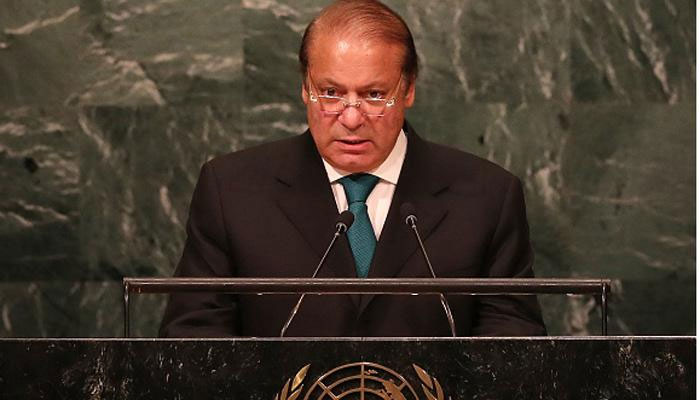Nawaz plays ‘Kashmir’ card at UN, hails Burhan Wani; India hits back, calls Islamabad a ‘terrorist state’
 United Nations: Strongly raising the Kashmir issue at the United Nations General Assembly, Pakistan on Wednesday accused India of being in “illegal occupation” of Jammu and Kashmir, and demanded a plebiscite and an independent inquiry into the deaths in the current unrest.
United Nations: Strongly raising the Kashmir issue at the United Nations General Assembly, Pakistan on Wednesday accused India of being in “illegal occupation” of Jammu and Kashmir, and demanded a plebiscite and an independent inquiry into the deaths in the current unrest.
Extending his support to the “struggle of Kashmiri people”, Pakistan Prime Minister Nawaz Sharif said that peace and normalcy cannot be achieved between India and Pakistan without resolving the Kashmir issue.
“The UN Security Council has called for the exercise of the right to self-determination by the people of Jammu and Kashmir through a free and fair plebiscite held under UN auspices,” Sharif said during the general debate of the 71st session of General Assembly of the United Nations in New York.
Stating that Pakistan wants peace with India, Sharif said that his country has gone the extra mile seeking talks but that India has “imposed preconditions”.”Peace and normalisation between India and Pakistan can’t be achieved without discussion on Jammu and Kashmir,” Sharif was quick to add.
He further stated that the pre-conditions imposed by India on any dialogue “cannot work”.Calling the ongoing crisis of Kashmir as a legitimate struggle of people, Sharif said: “Pakistan fully supports the demand of the Kashmiri people.”
“On behalf of the Kashmiri people and Pakistani nation I demand an independent inquiry into the extra judicial killings and a UN fact-finding mission to investigate brutalities perpetrated by the Indian forces,” Sharif said, adding he had with him the dossier on “India’s human rights abuses”.
Sharif also mentioned Hizbul militant Burhan Wani, whose killing on July 8 sparked off the current unrest in the Kashmir Valley, terming him a “young leader” and the symbol of the Kashmiri unrest.Pakistan had observed a black day to protest Wani’s killing by Indian security forces and termed him a martyr – an issue that has led to further worsening of bilateral ties.
“Burhan Wani, the young leader murdered by Indian forces has emerged as a latest symbol of the Kashmiri intifada (uprising) of a popular and peaceful freedom movement,” said Sharif.
Sharif said the “indigenous uprising” in Kashmir has been met with “brutal repression by Indian soldiers” and would “only fortify the determination of Kashmiris to fight for their rights””Pakistan fully supports self-determination of Kashmiris’ legitimate demand,” he said.He said the UN Security Council should ensure implementation of resolutions on Kashmir.
“Pakistan fully supports the demand of the Kashmiri people. Their struggle is the legitimate one for liberation from alien occupation”, he added.Sharif also mentioned “Daesh” (Islamic State), “Palestine” and Afghanistan issues, supporting talks between Afghanistan government and Afghanistan Taliban.
Pointing out that Pakistan itself has been a major victim of terrorism, the Pakistani premier said that his country carried out the largest anti-terror operation Zarb-e-azb, of the world, dedicating 200,000 security personnel to fight home grown terrorist outfits.
Raising concern over the rising “Islamophobia and Xenophobia”, he called for the international community to suppress “Daesh (IS)”.”We will not win the fight against terrorism, as long as we do not address its root cause which lie in the poverty and ignorance,” he said.
India hits back
India on Thursday called Pakistan a “terrorist state” and accused it of carrying out “war crimes” against Indians through its “long-standing policy” of sponsoring terrorism, hours after Pakistan Prime Minister Nawaz Sharif racked up Kashmir issue at the UN General Assembly session.
In a strong rebuttal, India said the terrorists designated by the UN continued to roam Pakistan’s streets freely and operate with State support.
Exercising India’s Right of Reply to Sharif’s “long tirade” about the situation in the Indian state of Jammu and Kashmir, first secretary in the permanent mission of India to the UN Eenam Gambhir said “the worst violation of human rights is terrorism.”
“When practised as an instrument of state policy it is a war crime. What my country and our other neighbours are facing today is Pakistan’s long-standing policy of sponsoring terrorism, the consequences of which have spread well beyond our region,” she said.With Agency inputs

